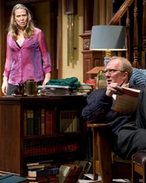SITE GUIDE
SEARCH
REVIEWS
REVIEW ARCHIVES
ADVERTISING AT CURTAINUP
FEATURES
NEWS
Etcetera and
Short Term Listings
LISTINGS
Broadway
Off-Broadway
NYC Restaurants
BOOKS and CDs
OTHER PLACES
Berkshires
London
California
DC
Philadelphia
Elsewhere
QUOTES
On TKTS
PLAYWRIGHTS' ALBUMS
LETTERS TO EDITOR
FILM
LINKS
MISCELLANEOUS
Free Updates
Masthead
Writing for Us
A CurtainUp Review
Who's Afraid of Virginia Woolf?
|
We have chosen five stories that, each in their different ways, reflect on the public/private self: We live in public space. We live in private space. What happens when the door between them opens? -- Martha Lavey, Steppenwolf artistic director.
|

Amy Morton and Tracy Letts in Who's Afraid of Viriginia Woolf?
|
Edward Albee's "long night's journey into day" depicts the take-no-prisoners game-playing of two toxic spouses. Experts in serial belittling, George and Martha indulge in Olympic imbibing as they entertain and undermine a younger couple who lack the illusions that protect a marriage from too much truth.
But tonight George goes too far — farther than usual in this production. By the end Albee's Achilles-heel fighters must face their feelings minus what Ibsen called the "life lies."
Rich with telling mood shifts, Pam MacKinnon's revival, Steppenwolf's second stab at this show, underlines the fun behind the games before miring us in recrimination and betrayal. A master of passive aggression, Tracy Letts (whose Pulitzer-winning August: Osage County mirrors similar family dysfunction) delivers a George who cracks as he wisecracks, usually at the same time. But this George is almost murderous in second-act game-playing, achieving a ferocity seldom seen even in this relentless hatefest. Just as Albee tests the limits of how far two spouses can push each other without unleashing more than they can take back, MacKinnon's passive-aggressive, three-act pugilistics lands K.O. after K.O., almost exhausting the play's capacity to still shock, nearly 50 years after its premiere.
Though lacking the faded majesty of Albee's "earth mother," a still- sensuous Amy Morton shows how Martha's thwarted maternal impulses have been twisted into sexual predation. This controlling virago is used to having her way with her cowed husband and the faculty newbies she beds, human sacrifices to all that's missing in her life. What takes her by surprise as much as by force is George's ruthless willingness to break the rules of the last game until it can no longer be played. The audience is equally astonished.
As neurasthenic Honey, Carrie Coon finds the heartbreak in hysteria, managing to be vulnerable and ridiculous at the same time. Already worn down by life, Madison Dirks is not the usual muscular, musky Nick. But his weakness makes him ripe for conquest by an older couple who, like the cosmopolitan one in Albee's The Play About the Baby, are capable of manifold deception — of themselves even more than others.
At play's end we usually see George and Martha, crushed into honesty as Martha sobs on the living room couch and the sun streams through the front window. But here the couple, reduced by refugees in their own home, are deep downstage and on the floor, surrounded by a cold spot while the dawn comes up without any redeeming sunlight. It's not at all clear that George and Martha can heal more than they hurt.
For more about Edward Albee see Curtainup's Albee Backgrounder.
|
Who's Afraid of Virgina Woolf? Written by Edward Albee Directed by Pam MacKinnon Cast: Carrie Coon (Honey) , Madison Dirks (Nick), Tracy Letts (George), Amy Morton (Martha) Lighting: Allen Lee Hughes Sound: Michael Bodeen, Rob Milburn Scenic design: Todd Rosenthal Costume design: Nan Cibula-Jenkins Fight choreographer: Nick Sandys Steppenwolf Theatre1650 N. Halsted St. Chicago, IL 60614 From 12/02/10 to 2/06/11 Reviewed by Lawrence Bummer 12/22/10 |
|
REVIEW FEEDBACK Highlight one of the responses below and click "copy" or"CTRL+C"
Paste the highlighted text into the subject line (CTRL+ V): Feel free to add detailed comments in the body of the email. . .also the names and emails of any friends to whom you'd like us to forward a copy of this review. Visit Curtainup's Blog Annex For a feed to reviews and features as they are posted add http://curtainupnewlinks.blogspot.com to your reader Curtainup at Facebook . . . Curtainup at Twitter Subscribe to our FREE email updates: E-mail: esommer@curtainup.comesommer@curtainup.com put SUBSCRIBE CURTAINUP EMAIL UPDATE in the subject line and your full name and email address in the body of the message. If you can spare a minute, tell us how you came to CurtainUp and from what part of the country. |



